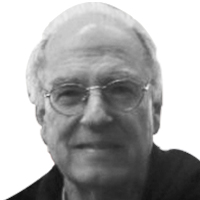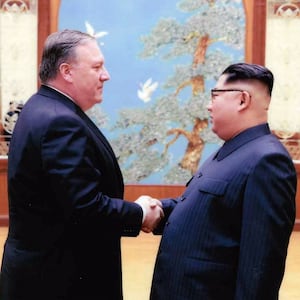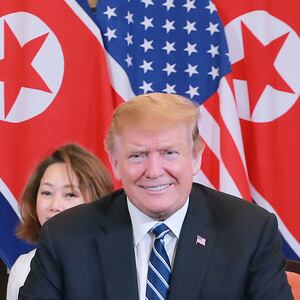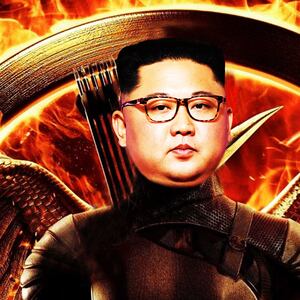North Korean leader Kim Jong Un has at last played the Russian card, meeting President Vladimir Putin for their first summit. But he’s still holding it close to his chest.
Yes, Kim appeared to have gotten along better with Putin in Vladivostok than he did with President Donald Trump in Hanoi, where the summit meltdown seems to have cost a top North Korean diplomat his job and is rumored to have cost four lesser envoys their lives.
After Kim arrived by train (in a scene CNN’s Jeanne Moos likened to a Mussolini-Hitler summit parodied by Charlie Chaplin in The Great Dictator) Putin and Kim talked for an uninterrupted two hours at a university. They then appeared in front of the press to recite opaque and most likely pre-scripted diplospeak.
No, they did not emerge with a joint communique affirming whatever they said about the two most pressing issues—denuclearization and sanctions. If Trump was looking for his buddy Putin to deliver something on those issues, it would seem he’ll be disappointed.
There was no indication that Putin got anywhere in persuading Kim to get rid of his nukes and missiles, and there was no sign that Putin would join Kim in trying to persuade the United Nations Security Council to drop the sanctions imposed with the unanimous approval of its five permanent members, including Russia and China, after the North’s nuclear and missile tests in late 2017.
Instead, all that Putin would say was that he and Kim had talked over “what should be done to improve the situation,” and Kim said they had had “a very fruitful exchange” about ways to achieve “a peaceful settlement.”
Just what was meant by “peaceful settlement” was left vague, although Kim presumably told Putin about his desire for a “peace treaty” formally ending the Korean War. Kim would not have been able to press that idea too far, however, since the former Soviet Union was not a signatory to the armistice signed at the truce village of Panmunjom in July 1953, even though the Kremlin had supplied planes, tanks, and artillery to North Korean forces.
The fact that the two finally met was definitely a sign, however, that Putin would like to play a bigger role in the Far East, notably the Korean Peninsula, in competition with China as well as the United States.
Putin left no doubt of his vision of a place for Russia at the table, any table, telling Tass, the Russian news agency, that he was “confident” that “international guarantees” for North Korea would “be necessary.” He even suggested a return to dormant six-party talks, including China, the U.S., Japan, Russia, and the two Koreas, saying they might help “in developing a system of international security guarantees” needed by the North.
And why not, he suggested, come up with an aid program—something Trump has made much of, too? “If these projects and similar ones were implemented,” he was quoted as saying, “this would create the necessary conditions for building the trust that’s so necessary for solving the key issues.”
In fact, the conversation may also have gotten down to one of Russia’s longstanding dreams—a railroad running up the Korean Peninsula, from South Korea through North Korea and then on to Siberia for carrying freight to Europe.
As Yuriy Krupnov, Moscow-based analyst at the Institute of Demography, Migration and Regional Development, told The Daily Beast. “We have built railroads and developed the port on the Sea of Japan for a big economic breakthrough in our cooperation with China. North Korean ports play a big role in this business plan; Trump should pay attention—this tango could be danced by all three of us, Russia, China, and United States.”
Clearly, the summit was intrinsic in Putin’s attempt to reassert Russian influence over North Korea, which Soviet forces ruled in the immediate aftermath of the Korean War as part of a deal with the U.S. dividing the peninsula between North and South at the 38th parallel.
The Soviet Union, under dictator Joseph Stalin, was responsible for bringing Kim’s grandfather, Kim Il Sung, to North Korea aboard a Soviet merchant vessel and installing him as leader of a caretaker government. Kim Il Sung had sat out World War II as a captain in the Soviet army, living near the far eastern city of Khabarovsk, but he had no responsibilities. It was while he was there that Kim Jong Un’s father, Kim Jong Il, was born, though North Korean propaganda maintains the mythology that Jong Il was born on the slopes of the sacred Mount Paektu on the Chinese border.
Kim Jong Un is assumed to have pleaded with Putin for breaks in trade and aid, which Moscow provided for almost nothing before the end of communist rule and the breakup of the Soviet Union nearly 30 years ago. North Korea, suffering under sanctions and crop failures, desperately needs oil and gas, which the Soviet Union used to ship into North Korea in return for virtually useless North Korean currency. In 1990, Moscow began demanding payment in real money—full value.
Kim Jong Un journeyed to Vladivostok by train right after getting rid of the man who had most to do with preparing his two summits with Trump. Kim Yong Chol, vice chairman of the Workers’ Party, of which Kim is chairman, was replaced as head of the United Front Department, responsible for dealings with the U.S. He had met Secretary of State Mike Pompeo on several occasions, including a visit to the U.S. during which he met Trump in Washington.
Presumably, however, Kim Jong Un saw Kim Yong Chol as responsible for the failure of his summit with Trump at the end of February. That meeting ended with Trump declaring his abiding friendship with Kim Jong Un, but demanding that Kim reveal where North Korea has all its nuclear facilities and agreeing to complete denuclearization.
Kim Yong Chol was not in the North Korean delegation to Vladivostok – a clear sign that he’d been sidelined, if not disciplined, for failing to let his boss know that Trump was serious about his demands and would probably agree to nothing less. Kim Jong Un obviously was caught by surprise by Trump’s walkout.
There was even a report by a small Japanese news and photo agency, Asia Press, that four members of the North Korean foreign ministry had been executed for their role in the Hanoi summit. According to the report, the four were accused of having accepted bribes in return for information provided to the Americans in the run-up to the summit. The report said military as well as civilian officials had witnessed the executions by firing squad, but there was no verification.
For Kim Jong Un’s summit with Putin, there was no advance build-up or prediction of results, just that the two would meet and review all the sensitive issues. Viewed that way, the summit was still a breakthrough considering that Russia had appeared as a minor player while Kim met China’s President Xi Jinping four times, amid much pomp and circumstance, in Beijing.
Basically, Kim was following in the footsteps of his father, who had met Putin in Moscow in 2001 and 10 years later conferred with Dmitry Medvedev, the Putin sidekick who was then filling in as president. Both Kims, father and son, traveled to Russia by train, as indeed Kim Jong Un had done when he went to Hanoi to meet Trump.
Putin had a military honor guard greet Kim on his arrival in Vladivostok, matching the welcome accorded Kim by the Chinese, a sign of a budding new relationship grafted onto the historic ties of the Soviet era.
—Anna Nemtsova in Moscow also contributed reporting to this article.








